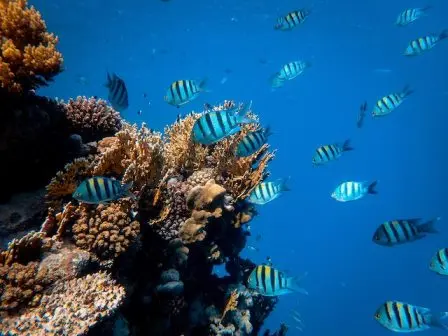Are you setting up an aquarium in your home? If yes, you must consider creating either a saltwater or freshwater tank.
You may also wonder about adding some saltwater fish to a freshwater tank. Most of the saltwater fish cannot survive when placed in fresh water.
Saltwater fish evolve to survive within a specific range of salinity, and placing them in freshwater can cause stress on their body and disturb the internal system.
So,how long can a saltwater fish live in freshwater? It depends on various factors like fish species, water salt amount, aquarium size, and many more.
But most saltwater fish will show illness signs within a couple of hours and may die within a week or two.
The article discusses why a fish dies because of salinity changes in water. So, you can keep reading this article to learn more about such information.
Osmosis And Osmoregulation
Have you ever wondered why saltwater fish cannot survive in fresh lakes and ponds? Similarly, have you ever thought about why freshwater fish cannot survive in the nutrient-rich salt water?
Well, the reasons can be because of osmoregulation.
Imagine you have 100 ml of water in a beaker and add 15 grams of salt. Here, the water is the solvent, and the salt is the solute.
Now, consider a second beaker with 100 ml of water and add 50 grams of salt.
Now, you have two mixtures with varied solute concentrations. The beaker in which the solute concentration is higher is known as hypertonic, whereas the beaker in which the solute concentration is lower is known as hypotonic.
Add these two solutions in a beaker separated by a semipermeable membrane. The membrane will have pores, which must be big enough for the water molecules to pass and hinder the sugar molecules.
So, in short, hypotonic and hypertonic solutions will be separated by a semipermeable membrane on both sides of the beaker. The water molecules on the hypotonic side are higher than on the hypertonic side, and hence, these molecules start moving toward the hypertonic side until equilibrium is reached.
So, osmosis is the diffusion process of water molecules through a semipermeable membrane from a higher to a lower concentration area until equilibrium is reached.
How Do Cells In A Fish React When It Moves From Salt Water To Fresh Water?
We all know that fish live in water. But if you place a saltwater fish in freshwater, it cannot survive. It is because of the difference in salt concentration.
The sea water is hypertonic to the fish surrounding it. It means the body of seawater fish has lower salt than the seawater.
We know by the osmosis process that water will move from a highly concentrated area to a lower concentrated area separated by a semipermeable membrane. The same case happens in seawater fish.
The seawater fish will release water through gills and other organs(semipermeable membrane) through osmosis. However, releasing too much water can dehydrate the seawater fish within a short time. So, it drinks a lot of seawater to survive.
A considerable amount of salts are retained inside the body of seawater fish, and the gills release the rest as urine.
So, osmoregulation and hydration play an important role in surviving seawater fish in saline water.
But if you keep the seawater fish in freshwater, it will not survive for many days. It can even cause death within one or two weeks.
The freshwater will have less salt and more water than the seawater fish. So, the freshwater will start moving inside the bloodstream of the seawater fish.
The rate will be so fast that the seawater fish cannot expel all the water in urine. The seawater fish’s cells will swell and finally burst, which can lead to death.
What Happens When Salt Water Fish Is Placed In Fresh Water?
Saltwater fish are designed mainly to survive in saline water or seawater. But if you change the environment and shift it to fresh water, then the seawater fish will start to blat within a few hours and may eventually die within a few days.
It is mainly because of the osmosis process.
The body of saltwater fish is quite salty compared to fresh water. So when you keep a saltwater fish in freshwater, the freshwater will start moving inside the body of saltwater fish because of the osmosis process.
The water flow inside the body of seawater fish will continue until the slat concentration is equivalent to the surrounding fresh water.
Unfortunately, the seawater fish cannot expel the excess water in the form of urine. As a result, the water starts accumulating in the sea fish’s cells. So you will first notice bloating within a few hours of keeping seawater fish in fresh water.
If you keep the seawater fish in freshwater, the cells will burst, and the fish will die.
What Happens When Freshwater Fish Is Placed In Seawater?
Freshwater fish will not survive for longer days if you keep them in seawater. Well, it is because of the osmosis process.
Let’s discuss this in detail.
The body of freshwater fish has evolved to survive only in fresh lakes or fresh ponds.
Freshwater is hypotonic to the freshwater fish surrounding it. It means that freshwater fish contain more amount of salt in comparison to freshwater.
Hence, the surrounding water will flow continuously inside the body of freshwater fish. The fish will excrete a lot of water in urine to prevent overhydration. The freshwater fish will not have to filter the salts as the water does not contain much salt.
Now, if you keep the freshwater fish in seawater, then the concentration of salt is higher in seawater. So, water will be removed continuously from the cells of freshwater fish, which can lead to dehydration.
Excess dehydration can cause the freshwater fish to die.
Which Saltwater Fish Can Live In Freshwater?
There are some saltwater fish that can live in freshwater. Those fish are known as euryhaline fish.
We are listing some of them below.
- Shad
- Gopy
- Molly
- Trout
- Barramundi
- White perch
There are usually two types of euryhaline fish. The first is anadromous fish(they live mainly in the sea but migrate to freshwater to spawn), and the second is catadromous fish(they live primarily in freshwater but migrate to the sea to spawn).
Let’s take the example of Barramundi. These fish live in freshwater. But they swim to the sea during the time of spawn.
The eggs of these fish will require seawater to survive. The eggs will further hatch and grow in seawater. They will move to fresh water when they grow or become adults.
Now, let’s take the example of salmon. These fish live in seawater for most of the time but migrate to fresh water for spawn.
But remember, the euryhaline fish need a specific time to adapt to changes in water salinity.
Some certain fish species can only tolerate a very narrow range of salt in water. These types of fish species are known as stenohaline species. For example, goldfish can only survive in freshwater.
Is Tap Water Safe For Fish?
You can use tap water in the aquarium. But you need to first treat it before using it in the aquarium. Tap water contains chlorine, which can be poisonous for fish. So you need to dechlorinate the water and then use it in the aquarium.
If you wish to create salt water in your home aquarium, add reef salt to tap water.
Frequently Asked Questions
1. Can all fish live in fresh water and salt water?
No, only certain fish species like salmon can survive in fresh water and seawater.
But most fish species are adapted to only one surrounding, i.e., freshwater or seawater.
If you keep a seawater fish in freshwater, the cells will swell up and burst. Similarly, if you keep freshwater fish in salt water, then the fish will die because of dehydration.
2. Is a goldfish a freshwater fish?
A goldfish is a freshwater fish. If you keep them in salt water, they will die because of dehydration.
3. What kills saltwater fish in aquariums?
High Ammonia and nitrite levels or high temperatures can kill saltwater fish in aquariums.
Conclusion
Fish are susceptible to salt changes in water. If you keep a seawater fish in freshwater, the cells will swell and burst within a few days. Similarly, if you keep a freshwater fish in seawater, the fish will dehydrate and die.
So you must understand the biological requirements and keep fish species fresh or seawater.
MORE POSTS: Green Tiger Barb Aquarium Fish Care
Swatisweta Parida
Latest posts by Swatisweta Parida (see all)
- Does Food Coloring Hurt Birds: Investigating the Impact on Avian Health - December 17, 2023
- Will cayenne pepper hurt birds? - December 17, 2023
- 9 Animals that start with an F - November 13, 2023

